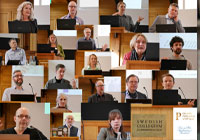
Photo credits:
Dan Larhammar
SCAS News - 20 May, 2024
Sciences against Misinformation
We have all gotten them. E-mails from a Nigerian prince promising us a small fortune if only we send
some money first. Messages about lottery wins, and missed package deliveries. If only we click the link
we will be able to retrieve them.
These attempts to fraud are easy to detect and resist. But what about more clever misinformation, making
us believe in a new diet or alternative medicine, that the consequences of climate change are exaggerated,
and that we only need to implement one certain policy to solve a complex problem such as an increase in
crime .
Misinformation comes in different forms and shapes and is used to influence our behavior and our decisions,
both on an individual and systemic level. Some governments, such as the Russian government, use misinfor-
mation so frequently that it seems even hard for those coordinating the campaigns to distinguish the truth
from lies, turning reality into surreality. One obvious example is the propaganda during the ongoing war
against Ukraine, but there have been many other examples earlier in history.
How can science contribute to the fight against misinformation? What new research is available, and how
can
it be used and implemented in order to provide better information for citizens, who can then make in-
formed and self-governed decisions? This was the theme of the symposium Sciences against Misinformation
which was held at SCAS during three days in April 2024. The term “sciences” here refers to science in the
broad sense, including all areas of research. It is obvious that only joined forces, with a multi- and inter-
disciplinary approach, will be able to detangle the complicated web that surrounds misinformation. During
the past few years, a lot of research has been done, and even if the prevalence of misinformation has risen,
there is hope that we can find ways for resistance and resilience.
The most basic tool for identifying misinformation is knowledge. Educated citizens with basic knowledge
in different areas can more easily detect when information is meddled with. Education plays a huge role,
and
includes not only school children but an ongoing, lifelong update of what we know. Many of the current
challenges, such as climate change, are very complex problems and also need more nuanced and longer dis-
cussions, rather than suggestions for quick-fixes, often driven by political or financial interests. For this we
also need reliable sources of information that provide citizens with the facts that they need to know, rather
than
what they want to know. Public service plays a critical role here, and in this case media can be part of
the
solution rather than part of the problem. Critical thinking and fact checking are also important tools for
recognizing misinformation. Several platforms for education are currently being developed and evaluated.
There are also plenty of other toolkits. The news agency AFP Paris has developed a tool that can detect mani-
pulated pictures and videos. The rise of artificial intelligence is behind a whole new range of problems, and the
developers of the tools to detect fraud are in a constant race to keep up. On an individual level, it is also impor-
tant
to understand our habits and how we make decisions. Those who want to fool us often use information
about
our habits to promote a sense of credibility, and seeing through that mechanism can help us to identify
misinformation when we encounter it.
This in turn leads to an emphasis on the need of time. Time to think through a decision, check the facts, compare
different information, and discuss with others. We need this sort of time both as individuals and institutions in our
everyday life in an ever faster society. Also other parts of society, such as media and policy makers, need time to
sort through the information presented to them and complete the picture from different sources. Cherry picking of information can lead to quick and seemingly evidence-based decisions, but might lead us to missing a significant
part of the bigger picture.
Scientists can make important contributions not only by further investigating different aspects of misinformation,
but also by building a climate of trust, which was highlighted several times during the symposium. A climate of
trust can for example be built up by communicating with other groups, and including them in the conversation
from
an early stage.
Last but not least we need discussions alive. Scholarly interdisciplinary work and conversations are highly
necessary,
and meetings like this symposium are essential to bring the different pieces of the puzzle together
and join forces.
Text: Natalie von der Lehr
The symposium “Sciences against Misinformation” was held at SCAS on 16-18 April 2024 and was an event of the
SCAS Natural Sciences Programme (Human Brains & Societies). It was funded by the Erling Persson Foundation
and the Knut and Alice Wallenberg Foundation. The organizers were Kathrin Glüer-Pagin, Dan Larhammar and
Thomas Nygren.
Listen to a collection of voices from the symposium in the SCAS Talks Podcast:
"SCAS TALKS Spotlight - Sciences against Misinformation" >>
(The podcast SCAS Talks is available on Spotify, Apple, and most other podcast platforms)
Read more: International Symposium on Mis- and Disinformation Held at SCAS >> (SCAS News, 22 April 2024)
Read more: SCAS Events Archive 2023-24 >>
Read more: "Three Days on Disinformation" (from UU News, 5 April 2024) >>






